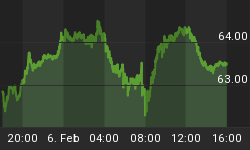Originally published at Sprott Money February 1, 2016.

Ten years ago this week, Alan Greenspan left his post as head of the US Federal Reserve, facing disgrace among hard money advocates, which largely persists to this day.
However gold investors can learn an important lesson from how little influence Greenspan, one of the gold standard's most eloquent backers, had during his 18-year tenure. A lesson that provides important clues as to future central bank monetary policy and its effect on precious metals prices.
That Greenspan was, and remains, a hard money advocate, is beyond doubt. His landmark article "Gold and Economic Freedom," which was published in The Objectivist, an Ayn Rand-backed newsletter, fifty years ago this June, makes the case for a gold standard in layman's terms, better than anyone before or since.
"Gold and economic freedom are inseparable," wrote Greenspan. "The gold standard is an instrument of laissez-faire (capitalism) and ... each implies and requires the other."
Greenspan's advocacy of the gold standard was a hugely controversial position in the 1960s and 1970s and remains so to this day. That this is so is in an illustration of the economics profession's almost total support for policies that have turned all Western nations into de facto state-run economies.
Why did Greenspan compromise?
That Greenspan compromised his views on gold is well-known. During his time there, the US Federal Reserve spawned a series of bubbles, that sowed the seeds of the financial crisis of 2007-2008, as well as of instabilities that remain in the system to this day.
However it is also fairly clear from comments that Greenspan made after his time in Washington, that he remains a hard money advocate. "Gold is a currency. It is still, by all evidence, a premier currency," Greenspan told a meeting of the Council of Foreign Relations last year. "No fiat currency, including the dollar, can match it."
It is also almost certain that Greenspan held that position during his entire time in Washington. Indeed one of his first acts, after he was appointed chairman of the Council of Economic Advisors in 1974, was to invite Rand, author of Atlas Shrugged, a hard money advocate herself, to his inauguration dinner.
Indeed according to a 2002 article in SmartMoney's Donald Luskin in a 2002, 40 years after publication of Gold and Economic Freedom, Greenspan apparently told Ron Paul that he stood by his text and "wouldn't change a single word."
Why did Greenspan compromise his most profoundly held views? Like most people the Maestro, as he became known, is a complex individual. A desire to advance his career no doubt played a major role.
However Greenspan, like many idealists, also likely believed that, by compromising his views, he might be able to change the system from within. Indeed there are signs that he was somewhat successful in that respect, as things got substantially worse after he left.
When Ben Bernanke took over as Fed chair in January of 2006, he eventually halted the interest rate hike policy that Greenspan had begun. Later Bernanke reversed all those hikes, cut rates to zero, and began the massive Federal Reserve balance sheet expansion, the effects of which remain with us to this day.
Redemption: lessons learned
However Greenspan's most enduring contributions to the gold community may have been the numerous mea culpas that he has issued after he left office. Unlike many politicians, including Bernanke himself, Greenspan has been increasingly candid regarding his challenges in Washington.
For example the fact that even a brilliant hard money advocate like Greenspan, had little or no future, unless he towed the political line of those who appointed him, provides a strong signal that things are unlikely to change. Indeed in a widely cited background comment to Marc Faber, a newsletter writer, Greenspan denied that he ever said the Fed was independent.
The upshot is that if you believe Greenspan, despite the Yellen Fed's current pause, the growing currency debasement spiral we are in will likely continue. The question now is will be the effect of such policies on gold prices over the next five years? When asked that question last year at the New Orleans Investment Conference Greenspan had two words for the interviewer.
"Measurably higher."
The views and opinions expressed in this material are those of the author as of the publication date, are subject to change and may not necessarily reflect the opinions of Sprott Money Ltd. Sprott Money does not guarantee the accuracy, completeness, timeliness and reliability of the information or any results from its use.















